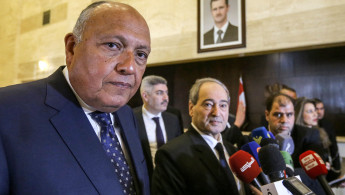Arab states must ease up on post-earthquake rush to normalise ties with Syria regime: HRW
Arab countries must hold the regime of President Bashar al-Assad accountable for atrocities it has committed during the Syrian conflict before they normalise ties with Damascus, Human Rights Watch said Tuesday.
The comments from the rights group come as Arab governments expressed support for the Assad regime and signalled willingness to re-establish relations since a devastating earthquake struck the Middle East on 6 February and killed almost 6,000 people in Syria alone.
Arab states are rushing to normalise ties with the regime "without pressing for accountability for the crimes that the Syrian authorities have committed or the critical reforms necessary for durable peace and a prosperous postwar Syria," said Hiba Zayadin, senior researcher for HRW’s Middle East and North Africa Division.
"Arab states seeking to normalise relationships should recognise that the Syrian government in power today is the same one that has forcibly disappeared tens of thousands of people and other serious human rights violations against its citizens even before the uprisings began," Zayadin said.
"During 12 years of war, it has committed countless crimes against humanity and forced millions into displacement. And it continues to weaponise humanitarian aid, diverting it from populations that oppose Assad rule."
Some 500,000 people have died and millions more have been displaced since the Syrian conflict began in 2011, following a brutal crackdown by Bashar al-Assad on protesters.
Most Middle Eastern countries cut ties with Syria early on in the war, with some backing armed opposition groups fighting the regime for control of the country.
But with Damascus, backed by Iran and Russia, able to regain control of most of the country in recent years, countries including Egypt, Turkey and some Gulf states have moved to welcome Syria back into the diplomatic fold.
Though it has control of the majority of Syria, Zayani said the Assad regime is continuing to commit war crimes in Syria — including the illegal use of cluster munitions in the north of the country last November.
Arab states must push the Syrian government and its allies to take measures including ensuring the safe return of refugees, releasing political prisoners, and reforming the Syrian state apparatus, she said.
"Without pushing for these reforms, Arab states risk endorsing and supporting the Assad government’s widespread abuses."





 Follow the Middle East's top stories in English at The New Arab on Google News
Follow the Middle East's top stories in English at The New Arab on Google News


